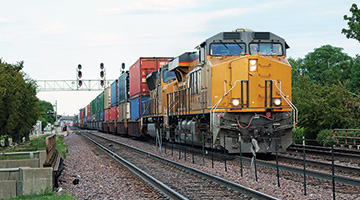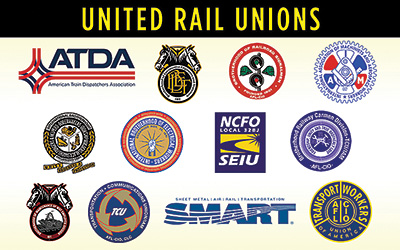PRESS ASSOCIATES UNION NEWS SERVICE

Washington, D.C. – After more than two years of fruitless talks in which rail bosses refused to make an offer workers could legitimately consider, 12 rail unions representing almost all 140,000 Class 1 freight rail workers have asked the National Mediation Board (NMB) to order mandatory arbitration between the two sides in an attempt to reach a new contract.
The unions’ June 3 letter to the NMB, which governs Labor-management relations in the rail and airline industries, said the big freight railroads, such as the Burlington Northern-Santa Fe (BNSF), CSX and the Union Pacific had, in so many words, failed to bargain in good faith.
Railroad Workers United (RWU), an organization of grassroots workers at all rail carriers, which first publicized the joint union letter, welcomed the unions’ unanimity and told its members to gird for a struggle.
“This truly is a historic development,” the group said. “All 12 rail unions are issuing a joint statement on the state of national bargaining. RWU has been pushing for a universal coalition of ALL rail unions since our founding in 2008. It is up to every rank and file member to demand that the unions stand together and fight back united. It is the only way to win.”
FUTURE IMPLICATIONS
The future of the talks between the unions and the carriers is important. Railroads are huge bulk carriers of key products – everything from oil to coal to corn to cars – and a vital link in the U.S. supply chain.
As a result of carriers’ own decisions, they’re also short-staffed, producing the tie-ups that have bedeviled the supply stream of goods nationwide for months. The unions protest the short-staffing, too. By contrast, one BNSF exec has advocated workerless freight trains.
NMB had mediated the final weeks of negotiations with the National Carriers Conference Committee (NCCC), but they went nowhere, the unions said. Mandatory arbitration by the board is the next step in the process.
“These joint mediated negotiations, under the direction of the NMB board members themselves, resulted from the unions’ request to be released from mediation after more than two years of bargaining with the major U.S. Class I railroads,” the unions’ letter stated.
“In spite of the unions’ best efforts to negotiate a fair agreement, the NCCC and the rail carriers still refuse to make a comprehensive settlement proposal that our members would even remotely entertain. In fact, the carriers continue to advance proposals that insult the hard-working union members who have carried our nation through the pandemic.
“Although all unions would prefer to reach a voluntary agreement, it has become quite clear at this point the rail carriers will not bargain in good faith to that end. For that reason, all the rail unions are again requesting the NMB put forth a proffer of arbitration to move our contract dispute through the remaining steps of the Railway Labor Act.”
Rail unions unite to fight for arbitration
 The unions comprising the Coordinated Bargaining Coalition are: the American Train Dispatchers Association (ATDA); the Brotherhood of Locomotive Engineers and Trainmen /Teamsters Rail Conference (BLET); the Brotherhood of Railroad Signalmen (BRS); the International Association of Machinists (IAM); the International Brotherhood of Boilermakers (IBB); the National Conference of Firemen & Oilers/SEIU (NCFO); the International Brotherhood of Electrical Workers (IBEW); the Transport Workers Union of America (TWU); the Transportation Communications Union/ IAM (TCU), including TCU’s Brotherhood Railway Carmen Division (BRC); and the Transportation Division of the International Association of Sheet Metal, Air, Rail, and Transportation Workers (SMART–TD).
The unions comprising the Coordinated Bargaining Coalition are: the American Train Dispatchers Association (ATDA); the Brotherhood of Locomotive Engineers and Trainmen /Teamsters Rail Conference (BLET); the Brotherhood of Railroad Signalmen (BRS); the International Association of Machinists (IAM); the International Brotherhood of Boilermakers (IBB); the National Conference of Firemen & Oilers/SEIU (NCFO); the International Brotherhood of Electrical Workers (IBEW); the Transport Workers Union of America (TWU); the Transportation Communications Union/ IAM (TCU), including TCU’s Brotherhood Railway Carmen Division (BRC); and the Transportation Division of the International Association of Sheet Metal, Air, Rail, and Transportation Workers (SMART–TD).
The Brotherhood of Maintenance of Way Employees Division and SMART Mechanical Unions are also bargaining as a coalition.
Collectively, these Unions represent approximately 140,000 railroad workers covered by the various organizations’ national agreements, and comprise 100 percent of the workforce who will be impacted by this round of negotiations.


